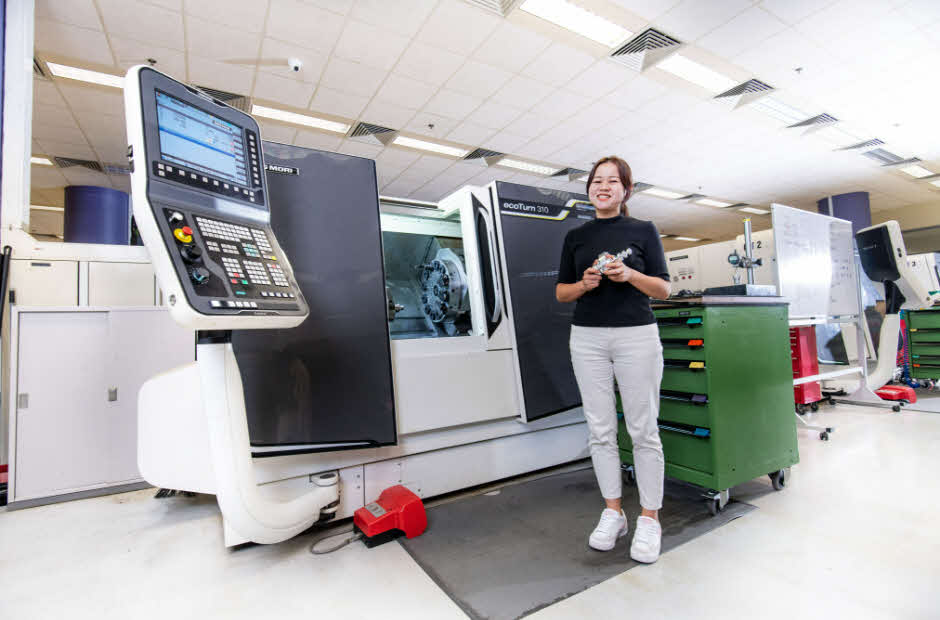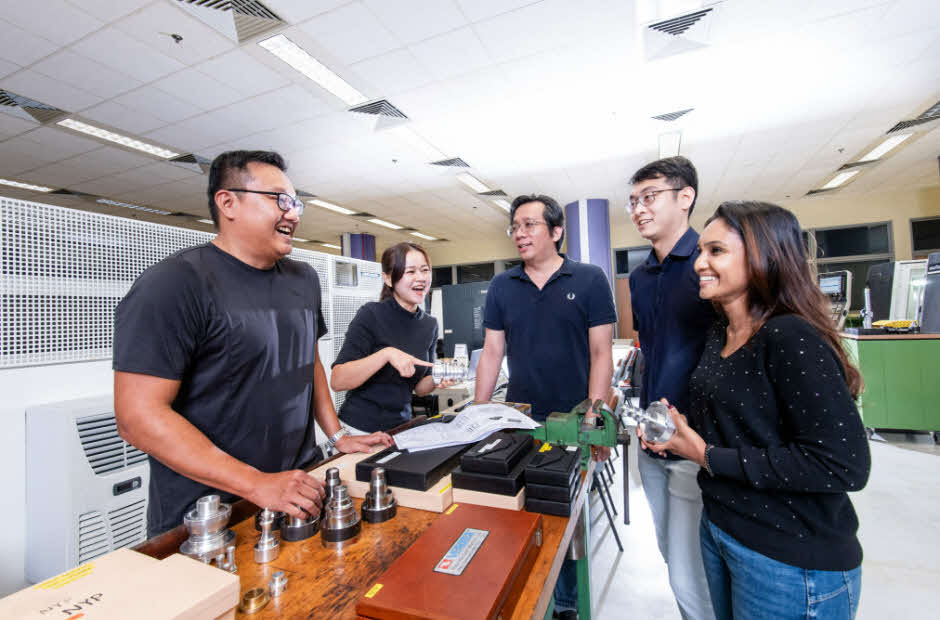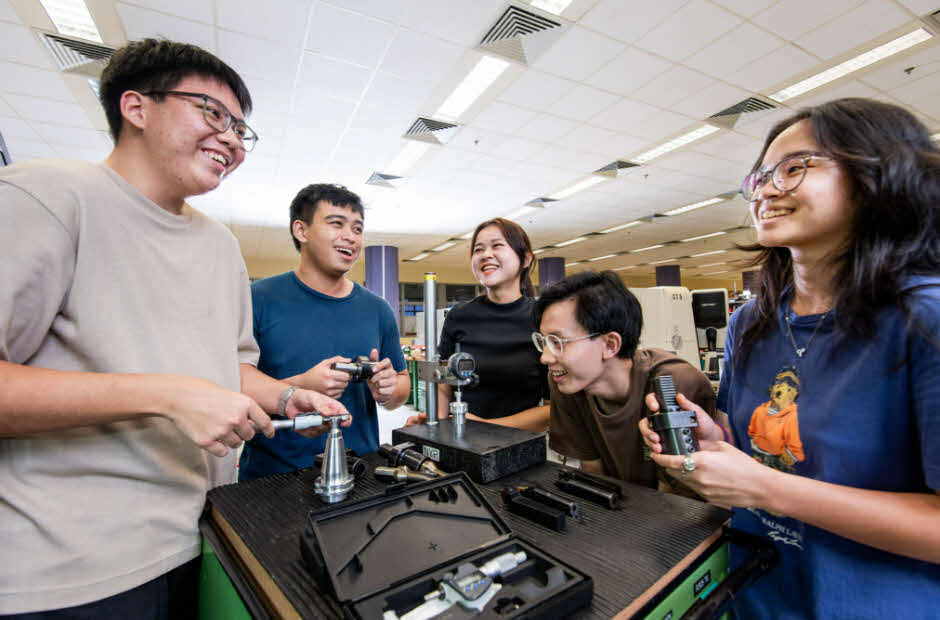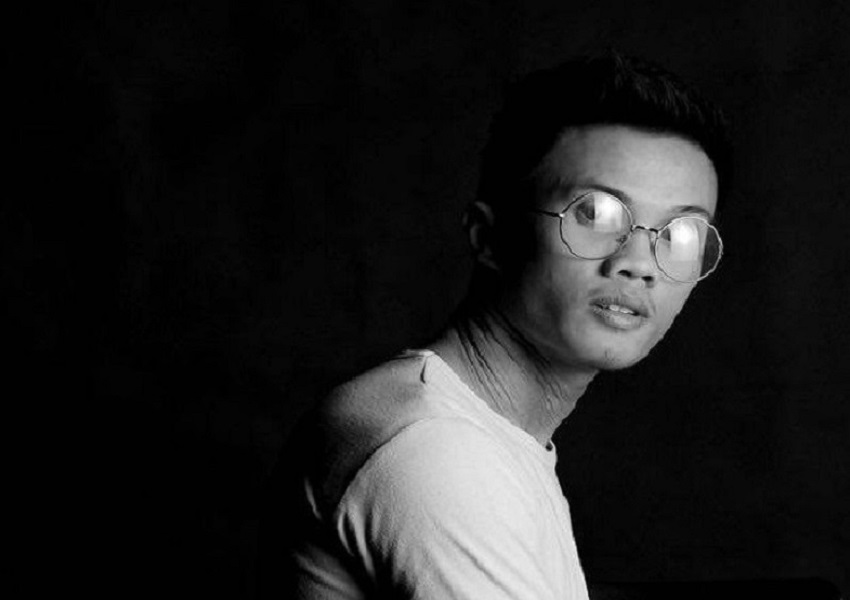Computer Numerical Control Turning (CNC Turning) is a manufacturing method that automates the control, movement and precision of machine tools through the use of pre-programmed computer software. Using a computer-controlled machine that cuts to ultra-fine specifications, those skilled in CNC Turning can create prototypes from technical designs, to aid the manufacturing of machining metal and plastic parts.
This may sound foreign to many of us, but is music to Ms Chia’s ears. She was the first Singaporean female to have competed in this category at the international WorldSkills competition in 2013 and had placed as one of the top ten finalists.
Inspiration: Precision-engineered for her role
Even in her early days, a career in engineering was on the cards for Ms Chia, given her passion for STEM subjects including Mathematics, Physics and Design and Technology in school. After joining Nanyang Polytechnic’s (NYP) Diploma in Digital and Precision Engineering, she was selected to represent the polytechnic at the local WorldSkills trials. “I was elated and overwhelmed at that time, as only the best performing learner from the local trials could compete internationally.”
In the lead-up to both the local and international WorldSkills competitions, Ms Chia was moved by her lecturers’ unwavering support, which gave her courage to persevere in what has traditionally been a male-dominated domain.
Inspired by their efforts, Ms Chia decided to pay it forward to future generations, and joined NYP as a lecturer. Coming full circle, she is currently training Singapore’s third female contestant for the same international WorldSkills competition, leveraging her own experience as a competitor, and skills that she had painstakingly perfected over the years.
Transformation: Gearing learners to what the world needs
Here’s a hack: any learner interested in joining a hackathon need simply sign up with Ms Chia. The reason is simple – she organises one every semester.
Hack-AM-Ton is an additive manufacturing 3D-printing hackathon held in collaboration with the Singapore Manufacturing Federation and Hewlett-Packard. Learners have the opportunity to work on real-life industry problem statements and present solutions to top management of partner companies.
For learners, such opportunities can build confidence, and provide a glimpse into how they can contribute to the industry. “It is a transformative moment where learners bridge the gap between academia and industry. It empowers them to articulate their ideas, receive real-time feedback, and understand the practical implications of their work in the professional landscape.”

“We need to give learners a holistic education and allow them to find their intrinsic motivation to learn – not simply to bring up their GPA, but to bring out the best in themselves.”
Ms Eunice Chia
Ms Chia’s emphasis on real-world applications, especially for the future, also anchor her efforts as the module lead for the interdisciplinary project-based learning (PrjBL) approach adopted by the School of Engineering.
PrjBL encourages learners to challenge convention, anticipate problems, and formulate solutions without being constrained by a particular discipline of studies. Ms Chia advocates for this approach to learning, precisely because real-life problems are rarely scoped to a single field, and often require a multi-pronged solution.
The PrjBL process can be demanding for both learners and lecturers. But Ms Chia stands by it, especially when she sees a change in her learners. “They are more engaged in class, ask more questions, and speak more confidently to the industry partners they work with.”
Most importantly, the PrjBL pedagogy is in line with her core vision as an educator, to “prepare learners for jobs that are yet to be created, to embrace technologies that have not yet been invented, and to solve problems that have not yet been anticipated”. Knowing the rapid changes and disruptions that her learners will have to face, Ms Chia has found it more important to nurture the spirit of inquiry and exploration, to prepare them for the future.
Ms Chia’s belief in this pedagogy has also inspired others. In 2023, she co-wrote a paper on this pedagogy for a conference in Norway attended by educators from 33 countries. Closer to home, she has inspired colleagues from NYP’s School of Business Management to also adopt the PrjBL approach last year.

Reflection: Partnerships that bring out the best in others
In the spirit of continuing education, Ms Chia partners industry stakeholders including the Economic Development Board, and Singapore Precision Engineering and Technology Association to offer industry training to in-service staff.
During the pandemic, she spent nine months co-developing an augmented and virtual reality programme for STMicroelectronics. This allowed the company’s 2,000 global employees to upskill from the comforts of home even with the prevailing travel bans.
She also ran Continuing Education and Training (CET) programmes in precision engineering, enabling experienced craftsmen to further develop their skills, and obtain recognition as Certified Master Craftsmen. This recognition enhances their career opportunities to become supervisors and leaders in the workplace.
A firm believer in Engineering for Good, Ms Chia also mentored and connected NYP’s Diploma in Advanced & Digital Manufacturing learners with the National Environment Agency to tackle declining recycling rates and the improper use of recycling bins among residents.
To her, “education extends far beyond textbooks and exams. It is a dynamic force that propels individuals to not only acquire knowledge but also contribute meaningfully to society.”
To aid her efforts, Ms Chia makes it a point to know each learner personally to work on their strengths. “As an educator, you need to give learners a holistic education and allow them to find their intrinsic motivation to learn – not simply to bring up their GPA, but to bring out the best in themselves.”






.jpg)